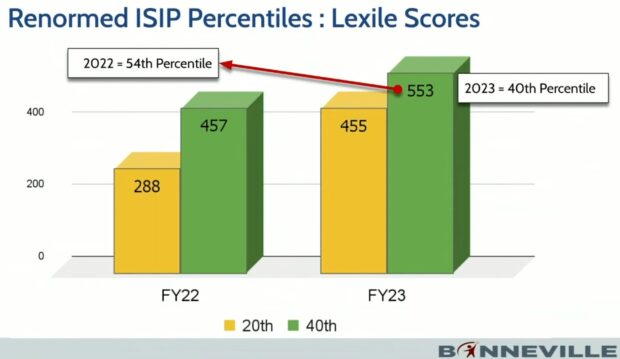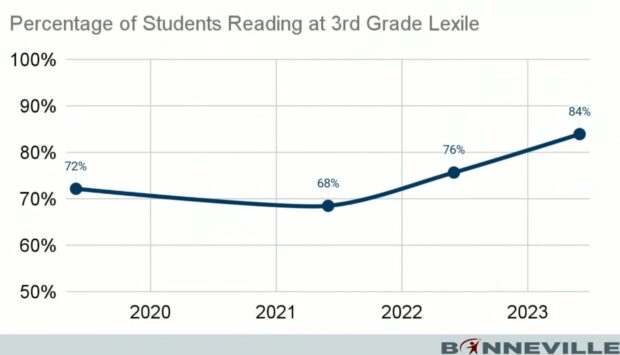IDAHO FALLS — Bonneville school board trustees approved a parental review of locally-adopted metrics to measure literacy scores and granted a two-year extension on the district’s mastery-based teaching approach, which is entering the fourth year of application.
For more than two hours out of a two-and-a-half hour school board meeting Wednesday night, superintendent Scott Woolstenhulme addressed how district schools can strategize student learning going forward. This change includes tweaking the cycle of learning graphic to introduce student responsibility and teacher effectiveness.

“For me, this is much more than pretty graphics on a page,” Woolstenhulme said. “These are the core things that we have to do to improve our effectiveness with students.”
In updating Bonneville’s continuous improvement plan, school leaders plan to stress an intense focus on student reading and writing abilities because these skills transcend to most school subjects, Woolstenhulme said.
Second, he stressed a district-wide focus on increasing personal student responsibility in order to build kids’ confidence in overcoming challenges in the classroom. In order to accomplish these, Woolstenhulme is asking Bonneville teachers to move into the next stage in its mastery-based education plan.
“This is an opportunity for kids to get more ready for college, doing things on their own time,” Woolstenhulme said to the board. “This emphasis is the next step. It was a heavy lift for teachers to get to this point and now, moving into our fourth year, it’s time we can have the expectation of extended learning opportunities at home.”
In addition to an individualized learning plan for students, teachers can use Mondays when students are not in class (based on Bonneville’s four-day school week) to provide more extended learning opportunities at home as well as additional help and support for those kids that need it.
In order to accomplish this, the district will host a national institute that will present how to bridge these principles for teachers. Woolstenhulme stressed that these are steps two and three towards a five-step approach that Bonneville is laying as the foundation to ensure personalized student learning and turn from an industrialized, 20th Century approach to schooling children that focused on seat time.
“If your time is fixed, your learning is variable. If you want your learning to be fixed, then you need to have variable time,” Woolstenhulme said. “This means some kids are going to take longer to learn certain things and some are going to learn them more quickly, which is the whole point behind mastery-based learning.”
This aligns with Idaho Code 33-1632, which states that, “the Legislature finds that moving toward mastery-based education where students progress as they demonstrate mastery of a subject or grade level is in the best interest of Idaho students. The Legislature further finds that moving from the current time-based system to a mastery-based approach will allow for more personalized and differentiated learning; create a focus on explicit, measurable, transferable learning objectives that empower students; and emphasize competencies that include application and knowledge along with skill development.”
Woolstenhulme also stressed the importance of highlighting teacher progress in a proposition to move from norm-referenced to criterion-referenced measurement of student performance on IRI literacy scores.

Norm-referenced learning measures students against their peers, not on a mastery of content, Woolstenhulme said. Because the IRI is a norm-referenced test, meaning that no matter how high students score, there will always be 20% of tier 3 kids who are significantly behind peers, 20% tier 2 kids, and 60% of students who are at or above grade level. Therefore, the median IRI score rose from 457 to 553 for those students at the 40% percentile.
“This paints a false picture of reading achievement not just in our district, but across the state,” Woolstenhulme said. “What’s more important is what we communicate to our teachers to show their progress and what we’re looking at. Using lexile scores provides a better picture of what our third grade reading have done over the last five years.”
In simpler terms, the percentage of third grade students reading at grade level rose from 68% to 84% from 2021 to 2023 (according to Bonneville records).

“This sends a fundamentally different message to our teachers to recognize the gains that they have made versus telling them that last year you actually dropped by 7% in your performance when that’s not what happened at all,” Woolstenhulme said.
The Bonneville board approved sending tweaks to the school improvement plan, including adopting lexile scores, out for parent comment. Improvement plan changes are due in October.
Additional notes:
- After trustee chairman Chad Dance stepped down, the Bonneville board swore in Richard Hess to assume office. Paul Jenkins was nominated and approved as the new chair. Carissa Coats was nominated and approved as the new vice chair. Randy Smith was nominated and approved as the new treasurer.
- The board approved a proposed resolution to be brought forward by the Idaho State Board Association to amend bond communication rules that went into effect on July 1 that prohibit districts from publicizing bond resolutions to the general populace without including specific disclosure language that is required on the ballot. Woolstenhulme asserts that this law may prevent school districts from reminding voters about upcoming elections and other important dates.
